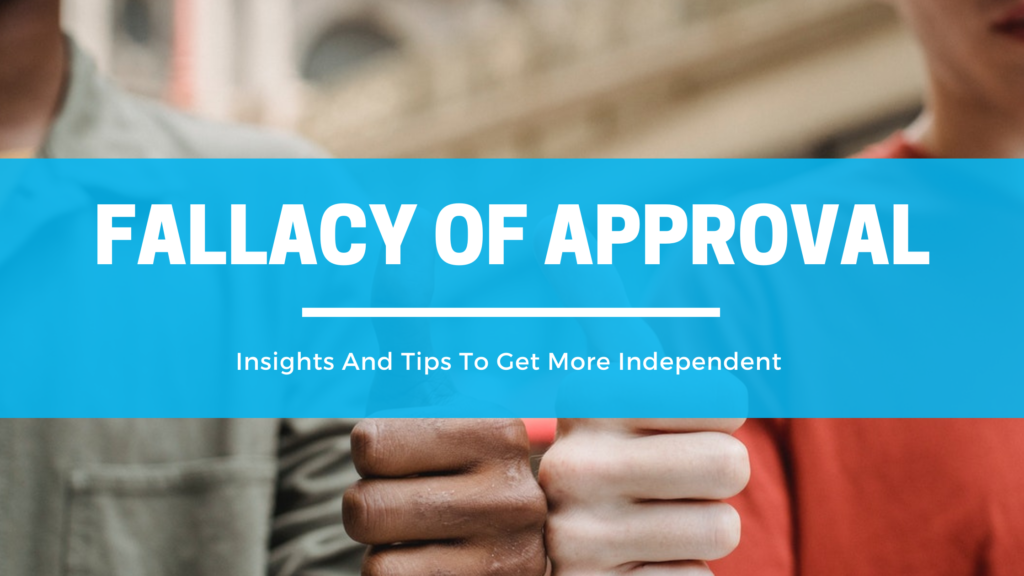Do you struggle with saying no?
Do you always pass all your decision to people close to you?
Are you tired of putting other people’s needs at the expense of your happiness and principles?
You’re probably suffering from the fallacy of approval.
Time for this to stop.
In today’s post, you’ll learn how to become more independent. This includes
- An explanation of what the fallacy of approval is
- Why you’re always seeking approval
- Ways of being more independent.
Let’s get right into it.
What is the Fallacy of Approval?
The fallacy of approval is a cognitive bias that leads to a pathological need to be liked by others, even at the expense of your goals and values.
This irrational thinking pattern is based on the idea that other people are better judges of our worth than we are. So, we put a lot of stock in what they think of us and try very hard to please them.
The fallacy of approval is pervasive, especially in people with low self-esteem or a poor sense of identity.
Fallacy of Approval Examples
There are many ways in which the fallacy of approval can play out.
Some people might always agree with others, even if they don’t actually agree. They do this to avoid conflict and gain approval.
Others might only make decisions after getting input from a lot of people, even if they don’t really need it. This is also an attempt to gain approval.
Some people might be very passive and never take stands or express their own opinions for fear of disapproval.
There are also people who go out of their way to do things for others, in the hopes that it will make them like them more.
Other examples of the fallacy of approval include:
- Passing up opportunities because we’re afraid of what others will think
- Doing things we don’t want to do, just to please someone else
- Allowing others to make decisions for us
- Not speaking up for ourselves or our beliefs
- Comparing ourselves to others
Related: Fallacy Of Should – Insights And Tips To Change Perspective
Why Do People Always Seek Approval?
One of the biggest reasons why people continually seek approval is low self-esteem.
This low self-esteem leads to a belief that they need to go overboard to be liked. Low self-esteem could also lead to self-criticism, resulting in a natural urge to seek validation from others.
Another reason why people continually seek approval is a lack of assertiveness.
This results from not being able to handle conflict and disagreement with others.
They feel that if they disagree, it’s going against the other person, so they just go along without voicing their feelings or opinions. This eventually becomes a habit where you’re always seeking approval from others.
The need to get everyone’s approval could also arise from one’s upbringing. If your parents always forced you to seek their attention, were unavailable, or were overbearing, you might be carrying this need into your adult life.
This phenomenon, known as the good child syndrome, could be why you constantly seek approval from everyone around you.
To learn more about how people develop the good child syndrome and how to overcome it, check out our article here.
Finally, some people seek approval because they’re afraid to stand up for themselves and their beliefs. They fear that others will judge them harshly or think less of them if they don’t comply with the status quo.
So how do you stop always seeking approval?
Keep reading to learn more.

13 Tips to Get More Independent
#1. Learn to Say No
One of the first steps to being more independent and stop always seeking people’s approval is to learn to say no.
Don’t be an always yes person.
You develop the confidence to put other people’s needs below your own by learning to say no. You’ll also realize that you’re dispensable and that other people can live without you.
Start small by saying no to little things, and then work your way up to the bigger ones.
You might feel guilty at first, but over time, you’ll get better at it.
Just remember to be polite.
#2. Check the Accuracy of Your Beliefs
Do you constantly seek approval because you think that’s what others want from you? Or do you think that by pleasing others, they will like and respect you more?
If it’s the former, then it’s time to start questioning the accuracy of your beliefs.
Are other people judging you based on what they think of your decisions? Or are they more concerned with themselves and their own lives?
And even if others do judge you, is it the end of the world for them to not like or respect you?
Start by questioning your beliefs about how much approval matters. Then take time to assess the evidence for and against these beliefs.
Once you have a more accurate view of things, it’ll be easier to make decisions without seeking approval.
You can also ask yourself this question: “What would I do if I didn’t care what others think?”
This will help you get in touch with your feelings and desires instead of what you think others want from you.
#3. Identify Patterns in Your Behavior
Another way to stop seeking approval is to identify your patterns of behavior.
Do you constantly seek people’s approval when it comes to big decisions? Or do you ask for advice before acting? Do you always seek consent from a particular type of person? Or do you get the same response from all people in general?
Start by taking note of your decision-making process. What are some common characteristics that stand out for each situation where you seek other people’s opinions or advice?
Identifying your behavior patterns will help you become more aware of when you’re seeking approval.
Once you’re aware of it, you can start to question why you’re doing it and if it’s essential.
For example, instead of asking for everyone’s opinion before making a big decision, try narrowing down the list.
Ask yourself what type of person would have the most insight into your specific situation. Then ask that person for their opinion, instead of everyone else. This will prevent you from seeking approval just to pursue it and get a bigger response.
#4. Replace Harsh Thoughts with Uplifting Ones
One of the best ways to stop seeking approval and become more independent is by replacing your harsh thoughts with uplifting ones.
By doing this, you’ll start believing that you’re important and valuable enough to stand on your own two feet.
So, when a negative thought like “I need other people’s approval to be happy” comes up, replace it with more positive thinking like “I’m independent and valuable just the way I am.”
Start by writing down a list of negative thoughts that you commonly have about yourself. Then come up with three or four uplifting replacements for each one.
When these thoughts start to creep in, remind yourself that you’re important and valuable enough to stand on your own two feet.
This will help you stop seeking approval and become more independent in no time!
#5. Start Recording Your Accomplishments
Another way to stop seeking approval is by continuing to record your accomplishments.
The more you recognize your strengths and achievements, the less dependent you’ll become on others’ opinions of you. So, every time something good happens in your life (like graduating college or landing a new job), write it down!
This will help increase self-esteem and make you less likely to seek approval in the future.
Start by keeping a physical journal or notebook, where you can write down your accomplishments as they happen.
When negative thoughts pop up about how other people don’t approve of you or respect you, refer to your journal for reminders that it’s not worth seeking approval.
#6. Surround Yourself with Nice People
Surrounding yourself with nice people is another way to stop seeking approval.
When you spend time around genuine and supportive people, it becomes less critical for you to seek their approval.
However, when you spend time with a narcissist, you’re more likely to seek approval from them. This is because their manipulative behavior makes you feel unworthy and reliant on them for approval.
So, make a point to spend time with genuine, supportive, and uplifting people. This will help stop those feelings of inadequacy from creeping in as often!

#7. Take a Break from Social Media
The fallacy of approval is worse than ever on social media.
Everyone posts their best moments in a bid to get likes and comments from friends and strangers alike.
This makes it hard to feel good about yourself when everyone else seems perfect! So, take a break from social media whenever you start seeking other people’s opinions too much. It will help boost your self-esteem and stop you from seeking approval in unhealthy ways.
Detox from social media occasionally, to prevent the fallacy of approval from taking over.
We recommend taking a break for a week or two at least. During that time, focus on spending more time with the people in your life who make you feel good about yourself.
When you come back to social media, you’ll be less likely to seek approval from others because you’ll already have a positive image of yourself!
#8. Don’t Compare Yourself to Others
As mentioned above, social media could lead to you comparing yourself with others. However, if you’re looking to be more independent, it’s essential to stop comparing yourself to others.
When you’re constantly comparing yourself to others, it becomes hard to be happy with who you are. This is because you’re always looking for ways that you fall short.
So instead of comparing yourself to others, focus on your unique strengths and accomplishments. This will help increase self-esteem and make you less likely to seek approval.
Comparison is the thief of joy, so don’t let it steal your happiness!
Focusing on your unique strengths will help you become more independent.
#9. Accept Yourself for Who You Are
You are you, and there’s no one else like you.
So, stop trying to be someone other than yourself!
It takes time to embrace your differences, but it will make a massive difference eventually. So many people spend their lives constantly seeking approval from others because they never feel good enough or unique enough for themselves.
But once you start accepting yourself for who you are, it will motivate you to work on your strengths and stop seeking approval.
Essentially, the fallacy of approval is all about wanting other people’s love or respect but not feeling worthy enough to get it.
As soon as you embrace your differences and accept yourself unconditionally, you’ll stop seeking approval in unhealthy ways.
Stop seeking approval and start living for yourself!
#10. Think About Your Positive Traits
It can be helpful to write down your positive traits, especially when you’re feeling down about yourself.
When you have a negative thought about yourself, challenge it with a positive trait that you possess. For example, if you think, “I’m not good enough,” remind yourself that you are kind-hearted or hardworking.
Focusing on your strengths will help boost self-esteem and make you more independent. You’ll become more confident in yourself when you can see the positive traits that define who you are as a person!
#11. Work on Your Confidence
A lack of confidence is one of the main reasons people seek approval from others.
If you don’t feel good about yourself, it’s natural to look for validation and acceptance from other people. But this can be a never-ending cycle that’s hard to break free from.
The best way to work on your confidence is by accepting yourself for who you are. Start with the things that make you unique and build from there.
It’s also helpful to do things that make you feel confident. This could be anything from wearing clothes that make you feel good about yourself to trying a new activity.
When you become more confident in yourself, you’ll stop seeking approval. You’ll be able to do things for yourself and won’t depend on others’ validation!

#12. Set Boundaries
When you’re constantly seeking approval from others, it can be hard to set personal boundaries.
If someone is saying negative things about you or trying to bring you down, don’t let them! Instead of letting people walk all over you, stand up for yourself and put your foot down.
Doing this will help increase your self-esteem and independence. Plus, you’ll feel better about yourself when people don’t get under your skin!
Setting boundaries with others can also help prevent the fallacy of approval in the future. For example, if a friend constantly tells you that everything you do isn’t good enough, it’s okay to say they’re crossing the line.
It’s essential to be assertive and communicate your needs to others. When you do this, it will help stop the fallacy of approval from happening in the future!
#13. Seek Therapy
If you feel like the fallacy of approval is negatively affecting your life, it may be helpful to seek therapy.
A therapist can help address any underlying issues causing this behavior and provide more insight into ways to become independent again. You’ll walk away with tools for self-care and better coping mechanisms, so you don’t feel the need to seek approval from others.
Working with a therapist can help you break free from the fallacy of approval and have more inner peace in your life!
Related Articles on Self Confidence
Bonus Tip: Live for Yourself
The best way to become more independent is by living for yourself.
Stop caring about what other people think and start doing things that make you happy.
If there’s something you’ve always wanted to do, go for it! Don’t let anyone hold you back from achieving your goals and dreams.
When you start living for yourself, you’ll stop seeking approval in unhealthy ways. You’ll be more confident in who you are and what you stand for.
Fallacy of Approval FAQs
What are Debilitative Emotions?
Debilitative emotions are harmful and difficult feelings that prevent you from functioning at your best.
Debilitative emotions make you feel like your whole life is crashing around you and you can’t do anything to salvage it.
Unlike other emotions that only last momentarily, debilitating emotions last longer. Debilitative emotions also differ from other emotions as they often arise from irrational thoughts known as fallacies.
What Could You Do to Minimize Debilitative Emotions?
Debilitatoive emotions often arose from self-defeating thinking patterns.
To minimize these emotions, the first step entails recognizing when destructive thoughts come up. Once you’re aware of your fallacious thinking, it will be easier for you to come up with alternative solutions.
In addition, it’s important to have a support system in place. This could be friends, family, or a therapist.
When you’re feeling down, talking to someone who will listen and offer helpful advice can make all the difference.
Lastly, don’t forget to practice self-care! Taking time for yourself is crucial when you’re struggling with debilitating emotions
What Are Emotional Fallacies?
Emotional fallacies are arguments that are based on emotions instead of facts.
The fallacy of approval is an example of an emotional fallacy. Other examples of emotional fallacies include the fallacy of causation, or the fallacy of perfectionism.
What is the Fallacy of Causation?
The fallacy of causation is another type of emotional fallacy. This fallacy assumes that one event caused another event to happen.
For example, if someone gets rejected from a job interview, they may assume that it was because of their appearance. However, other factors could contribute to the rejection (e.g., their qualifications).
When someone uses the fallacy of causation, they’re not considering all possible factors that could have contributed to the event.
What is the Fallacy of Helplessness?
The fallacy of helplessness is an emotional fallacy where someone feels like they’re unable to do anything.
Someone who uses this fallacy may feel that their actions will not make a difference or don’t have the ability to achieve their goals. For example, if you keep getting rejected from jobs after applying, it can be easy to feel discouraged and helpless.
However, it’s important to remember that you have the power to change your situation! You can network with people in your industry or update your resume.
When you stop using the fallacy of helplessness, you’ll be more motivated to take action and achieve your goals.
Related: Fallacy Of Catastrophic Expectations – Insights And Tips For More Balance
Any Further Questions?
There you go.
All you need to know about the fallacy of approval and how to become more independent.
Which of these tips will you put into practice? Do you know of any other tips and insights to becoming more independent?
Please tell us in the comment section.
And if you have any questions regarding the fallacy of approval or any of the tips discussed here, please ask in the comment section.
I’ll be glad to answer any question asked.
Related Content
Ways To Overcome The Good Child Syndrome
